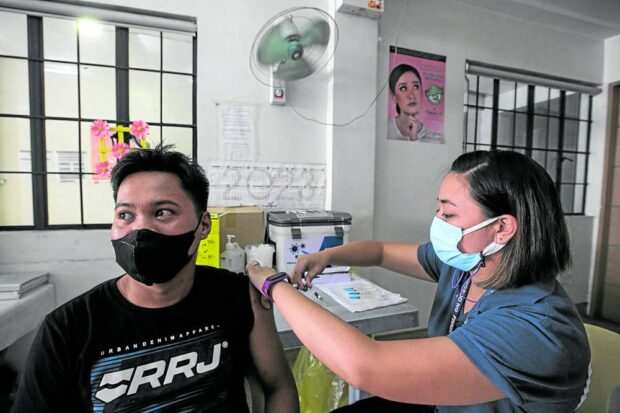Daily COVID-19 cases up by 112% – DOH

JAB FOR WORK A resident of Pasig City receives his first dose of COVID-19 vaccine at Rosario Super Health Center on Monday. He says he finally decided to get vaccinated due to work requirements. —LYN RILLON
The Department of Health (DOH) reported on Monday a 112 percent increase in daily new COVID-19 infections last week as the number of cases hit 1,352 although deaths and health-care utilization rates remained low.
On Sunday, 1,920 new cases were detected through laboratory tests, the highest single-day count since Oct. 21 last year, the DOH added.
The positivity rate last week was also the highest since January 2022. At 19.9 percent, it meant that one in every five people who underwent RT-PCR (reverse transcription polymerase chain reaction) testing was confirmed to be infected.
High positivity rates of over 20 percent were reported as well in Metro Manila and the provinces of Batangas, Bulacan, Camarines Sur, Cavite, Isabela, Laguna and Rizal.
In an update on Sunday, OCTA Research fellow Guido David said that the seven-day positivity rate in the National Capital Region went up from 17.2 percent on April 29 to 22.7 percent on May 6.
In Batangas, it was 23.2 percent; Bulacan, 20.1 percent; Camarines Sur, 45.1 percent; Cavite, 35.3 percent; Isabela, 25.9 percent; Laguna, 23.8 percent; and Rizal, 38.8 percent.
In Metro Manila, Quezon City reported the highest number of new COVID-19 cases at 193 followed by Manila with 85 and Makati City with 68.
David said the positivity rate in Metro Manila could go up further to 25 percent.
Overall, the DOH said that of the 9,465 people who were found positive for COVID-19, only 50 were either seriously or critically ill.
To date, of the 4,112 COVID-19 patients admitted to hospitals, 410 were in serious or critical condition. The 4,112 confined patients accounted for 36 percent of the 11,408 individuals reported as still infected as of May 7.As for the utilization of reserved COVID-19 hospital beds, the DOH reported that 16.5 percent of intensive care unit (ICU) beds and 21.2 percent of non-ICU beds were occupied.
The DOH also confirmed nine more deaths due to COVID-19, mostly from last year, bringing the total death toll to 66,453 out of the 4.1 million confirmed cases since the pandemic began in 2020.
Reducing restrictions
With the World Health Organization’s (WHO) recent declaration that COVID-19 was no longer a global health emergency, health authorities in the country would study and decide what remaining restrictions should be “slowly trimmed down” such as quarantine and isolation, and requiring a person to be vaccinated.
“The remaining restrictions like these, we could review them and [consider] how necessary they still are, and if not anymore, we should change them already…
We have to adjust our policies so that they can no longer be as destructive [to the economy] and if a situation arises that we can’t handle, we can better justify returning those [restrictions].
But as of now, it seems they (restrictions) are not really needed,” Dr. Edsel Salvana said at the televised Laging Handa public briefing on Monday.
Salvana, a member of the DOH technical advisory group for infectious diseases, said the WHO declaration meant that COVID-19 had become more controllable due to vaccines and medicines, making health protocols generally unnecessary.
“The WHO is saying that the impact of COVID on a daily basis is now getting more controlled, it’s no longer as endemic as before when we had no vaccines yet.
And we can say that we can predict what happens next—like what we’ve seen in the slight uptick of cases but the hospitals are not getting filled up. So, it’s not as bad or as dangerous compared to when we have not yet vaccinated many people,” he added.
Salvana said that ultimately, dealing with COVID would be like dealing with dengue and flu, which have “seasons” but whose spread can be checked.
“We have to understand that COVID is still here, it’s not yet gone. And cases may still rise from time to time… What the WHO is saying is not that the pandemic is over, not that COVID is gone—it’s still there. But we can now live our lives unrestricted, we don’t have to stay at home. We are learning to be with COVID… and we can do what we are doing daily without being afraid,” he said.
Welcome announcement
For the Department of Tourism (DOT), the WHO announcement was a welcome development as it would hasten the recovery of the country’s tourism industry which was badly affected by the pandemic.
“The end of the pandemic signals hope that tourism in the Philippines will continue to thrive and transform into a powerhouse that can be fueled by the hard work, distinct hospitality, love and warmth, and pride of place of the Filipino people,” the DOT said in a statement posted on its Facebook page.
“The unprecedented loss of life and livelihood brought forth by the pandemic caused so much suffering and upended the lives of countless Filipinos, including millions of tourism stakeholders and workers across the country,” it added.
—WITH REPORTS FROM JEROME ANING AND NESTLE SEMILLA INQ
RELATED STORY:
DOH, IATF to reassess COVID-19 policies after WHO declaration
For more news about the novel coronavirus click here.
What you need to know about Coronavirus.
For more information on COVID-19, call the DOH Hotline: (02) 86517800 local 1149/1150.
The Inquirer Foundation supports our healthcare frontliners and is still accepting cash donations to be deposited at Banco de Oro (BDO) current account #007960018860 or donate through PayMaya using this link.